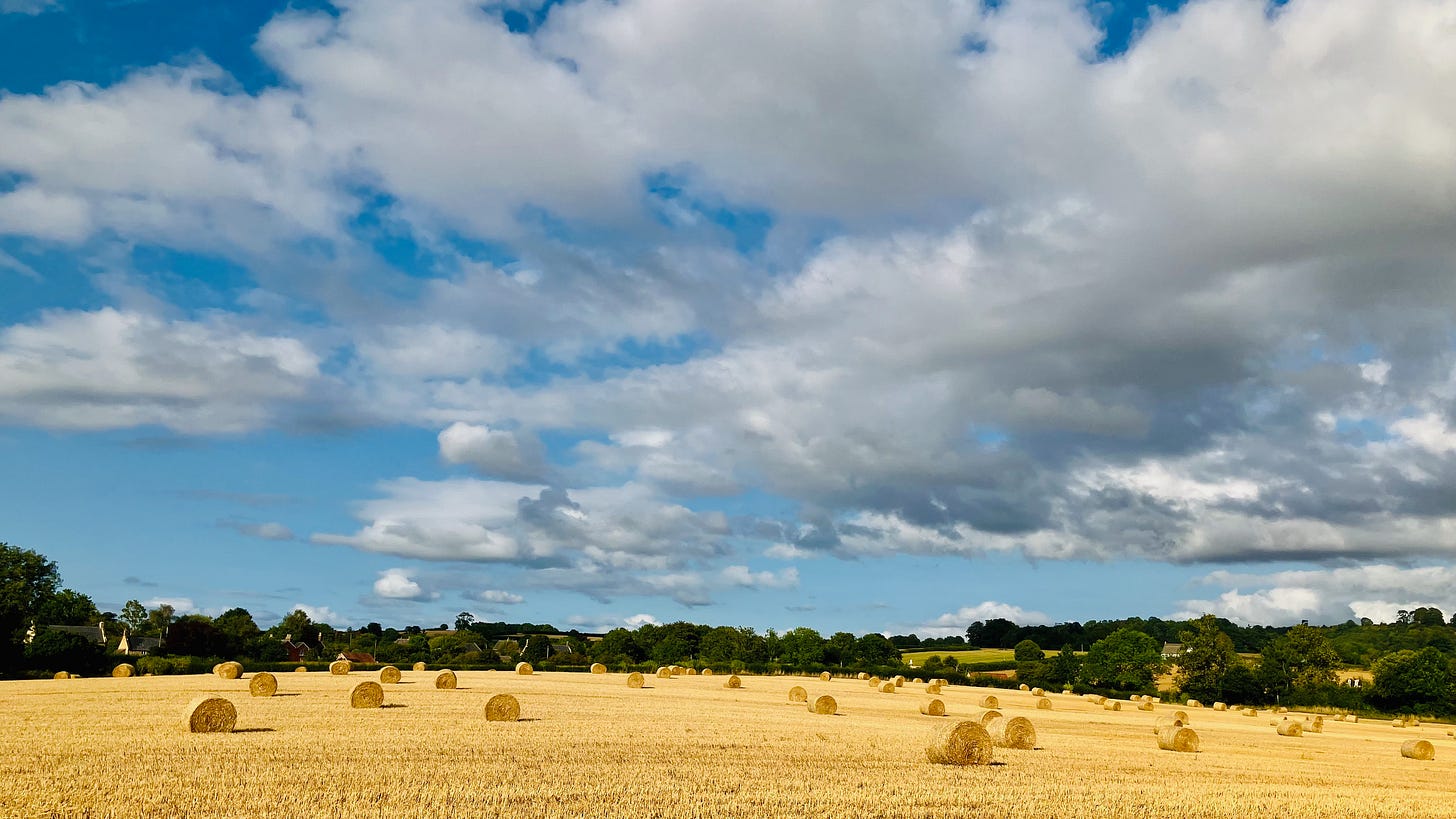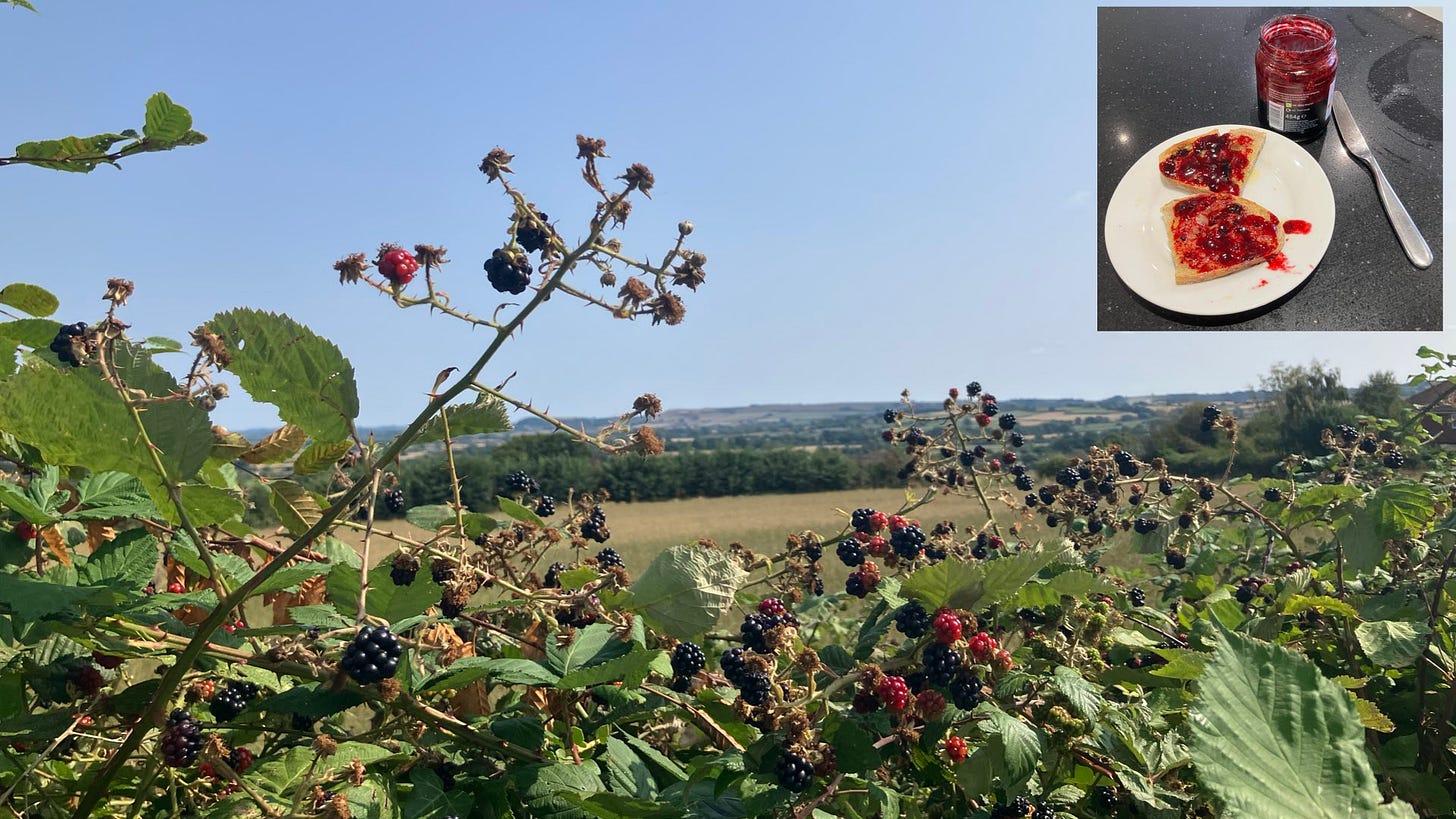Why We Should Stop Talking About the Weather
How blackberry jam helped me rethink England’s harvest.
Thank you to all those who volunteered to be advanced readers of my new book, The Psalm Psupplement, a 40-day devotional on the Psalms that I’ve been writing over the last year. You’ll have a chance to pre-order it, which will help me pay for a limited print run in September. I’m hoping it will be a really beautiful, hard-backed book. Please consider buying a copy when the chances arises.
I will be selling copies on tour. September is busy so do come and see me if you can. I’ll be in Trowbridge, Muswell Hill and Sidcup to name a few. I’m reliably funny for an hour or so, so do consider booking me for your church in 2026 as I’ll be performing God, the Bible and Everything (in 60 minutes) until at least September next year.
On Sunday night, I made blackberry jam. On a whim. On a stove. In a pan.
The sunset drew me out into the garden. I stood by my back fence and looked down to see a bounty of blackberries among the brambles. So I went back into the kitchen to get a tub and, within a few minutes, filled it.
The next question was this: what do I do now?
Tradition says: wash, freeze, and rediscover them 18 months later at the bottom of the freezer. I already have blackberries in there older than my iPhone SE.
This time, I wanted to eat them. So I found a quick jam recipe that didn’t require pectin sugar (the hurdle at which many of us fall). I washed the berries, added sugar and lemon juice, stirred until dissolved, pushed the goo through a sieve to remove the seeds, pulped the rest, boiled it briefly, and poured it into jars that could be said to have been sterilised. Hey presto: jam today, jam tomorrow. I’ve been having it for breakfast all week, the first fruits of the bramble bush.
1st August is Lammas – or ‘loafmas’ – in the liturgical calendar. It is a celebration of the first fruits of the harvest. We are now well into harvest season given the weather we’ve been having. Hay was cut, dried and gathered weeks ago. The wheat is also coming in early, causing much indignation and frustration. In some parts of England, wheat yields are catastrophically low because of the lack of rain in the spring. But oil seed rape is well above average.
Every year, we are amazed by some aspect of our weather. It’s either the driest spring since 1820, or the windiest May this century. A bumper crop is taken for granted, but a poor harvest which arrives at the wrong time is an outrage. We blame the weather. Or the climate.
The English famously like to talk about climate and weather, but we don’t talk about the other part of growing crops which is even more crucial: land. We don’t even think about the land. We assume the land is just somewhere we live – since we can’t live in the sky – and somewhere to grow food, although we would do it in vertical, high-rise labs on the edges of cities if we could. After all, that’s where everyone lives now. During the harvest last year, I wrote:
In 1801, only 17% of the population of England and Wales lived in cities. By 1891, it was 72%. One might call that a mass exodus of the countryside. It has to be one of the biggest changes in English history.
Isn’t that astonishing? The shires emptied and cities teemed with people working in factories, mills and shipyards whose work was fuelled by crops grown on the land. City dwellers, factory workers, politicians, opinion shapers, journalists and writers didn’t need to think about the land because the food just arrived on ships, barges, train and lorries.

There had been an agricultural revolution which continues today. Monster machines harvest wheat in moments, guided by satellites and hoovering up vast fields in minutes rather than weeks. What dominion over nature! So much for the curse of land issued to Adam in Genesis 3:17-19 in which God said:
“Cursed is the ground because of you;
through painful toil you will eat food from it
all the days of your life.
It will produce thorns and thistles for you,
and you will eat the plants of the field.
By the sweat of your brow
you will eat your food
until you return to the ground,
since from it you were taken;
for dust you are
and to dust you will return.”
It is easy to assume that these verses no longer apply. The land merely does our bidding. We spray off the thorns and thistles. The only dust is from the stalks of wheat that are threshed and immediately turned into straw. When yields are low, like this year, the obvious culprit is the weather. But what if it’s something else? Could it be something spiritual? Like the land? Is there a spiritual dimension to land?
The West has already conceded that there is. Try climbing Ayers Rock. Actually, don’t. You’ll be prosecuted and fined. And it’s not called Ayers Rock anymore, but Uluru. It was handed back to the Anangu people who claimed a special connection with the landmark in 1986, then closed to outsiders completely. The average Australian may be unconvinced, but the Anangu are merely expressing what has been in the pages of Scripture from the beginning: humans are connected to the land in a way that transcends access, usage, ownership or even ‘being there first’.
Adam was made from the ground. That’s what his name means. We might as well call him ‘dusty’. He was made from dust and will become dust. He is still connected to the land in terms of purpose, tending the plants of the field and forest that bear fruit. But now that harvest will be frustrated by thorns and thistles.
This theme continues throughout scripture. Abraham was promised a land by God, and his descendants ended up numerous but in the wrong land. They did not belong in Egypt but Canaan, so Moses, who stood on holy ground before the burning bush led them out of the wrong land. And Joshua led them into the Promised Land. It was so special that Namaan, when healed by Elisha in 2 Kings 5, he wants to take soil from Israel home with him so that he could remain faithful to the Lord back there.
We may still refer to ‘the holy land’ but we don’t mean it. In fact, a combination of low-church theology and enlightenment scepticism has caused many modern Christians to assume that no land is holy. They might point to the Temple curtain torn in two, to the Great Commission to all nations, and to Pentecost. But it is more likely that the opposite is true, that any land can be made holy when it has been won for Christ. Those early saints who went to the ends of the earth with the gospel encountered all kinds of strange things in wild lands that had not been brought under the rule of the King of Kings.
Centuries of deism, unitarianism, scepticism, atheism and now a resurgence of paganism could be handing back the land to false gods, principalities and powers. In John 12:31, Jesus says that his death on the cross will drive out “the prince of this world.” The land always belongs to someone – and not just the name of the owner on the title deed.
To whom does England belong?
England was won for Christ by waves of heroic saints that are celebrated and remembered in our liturgical calendar. We barely remember Columba, Aidan, Chad, Mellitus and Augustine of Canterbury who did not just bring a Christian message to people living on this island. They made the land of England itself Christian in some way. I don’t fully understand how that works theologically, but it seems consistent with scripture and is worthy of consideration before we blame the weather for yet another late running crop or poor yield.
Have we abandoned the land to gods who hate the one true God and his son Jesus Christ? Have we been doing that for decades, if not centuries? Perhaps we need to spread the word about the liturgical calendar, to be inspired by the examples of those heroes of the faith; maybe we need to watch the recent speech by Danny Kruger MP one more time. Maybe we need to do that one thing we really don’t want to do: stop talking about the weather and pray.
Hope you enjoyed that. Do pass it along to someone else who might like it. Cary’s Almanac is free and in your inbox every Friday lunchtime:
Have you checked out The Wycliffe Papers? It’s jokes for those serious about the Bible. New headlines dropped yesterday:




There seems to be such a connection between “land” and “people” in the Bible and the faithfulness or otherwise of the latter severely affecting the former. How wonderful though that the land’s fortunes are often restored when the people return to God. I know the maths isn’t quite that simple, but there is so much in store for the physical land/ Earth in the future when the people of God are redeemed bodily. Until then…